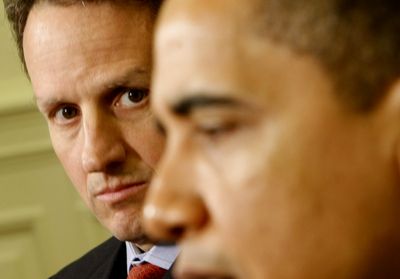Plan would bolster world economy
U.S. proposes billions for flailing nations

WASHINGTON – Treasury Secretary Timothy Geithner on Wednesday unveiled a sweeping plan that calls on the United States and other nations to offer billions more to bail out economies in crisis and prods a reluctant Europe to prop up the reeling world economy with more aggressive government spending.
But the campaign is triggering controversy on both sides of the Atlantic.
In Europe, some officials doubt the wisdom of falling deeply into debt to create jobs and halt the plunge in consumer demand, as the United States is doing. On Capitol Hill, members of Congress have grown wary of approving still more money.
Geithner said the administration will ask Congress to make $100 billion more available – nearly doubling the current U.S. commitment – to the International Monetary Fund to aid struggling nations. U.S. lawmakers said Wednesday they are already bracing for the administration to request hundreds of billions of dollars in more rescue funds for U.S. financial firms, and possibly a second massive economic stimulus package as well.
The debate over how to rescue the global economy is setting up a clash of ideas just as finance chiefs are converging in London this weekend to hash out a unified approach to the crisis.
Geithner said he plans to press his counterparts from major economies to boost their fiscal stimulus.
“Forceful” actions by the world’s leading economies are needed because “the global recession is deepening,” Geithner said.
Fresh data out of China, which had been a rare source of good news, showed exports there plunging a worse than expected 25.7 percent in February, indicating that the drop off in world demand is accelerating.
Given the intricate ties among the world’s economies, Geithner said, it is critical for leading economies to move in a “sustained” and “coordinated” fashion.
That includes boosting the amount of money available to organizations such as the IMF, he said. His proposal calls for the world’s leading economies to provide a total of $500 billion in additional loans – far more than what either the institution has asked for or what Europeans have backed.
Wednesday, European Union finance ministers, after a meeting in Brussels, signaled their reluctance to boost their stimulus packages, with some rejecting outright U.S. calls to step up their spending to combat the crisis.
While the U.S. hopes nations will pass stimulus packages that amount to 2 percent of each country’s annual economic activity – a conservative estimate of what damage the crisis may cause – Europe has resisted that standard. German leaders have approved a stimulus package that would spend only 1.5 percent of their annual economic activity, known as gross domestic product, or GDP. French officials have signed off on about half that.
“Recent American appeals insisting that the Europeans make an additional budgetary effort to combat the effects of the crisis were not to our liking,” Luxembourg Finance Minister Jean Claude Juncker told reporters after the Brussels gathering.
Less opposition exists elsewhere around the world. China says it wants to spend 2 percent of GDP for its economic stimulus, while Saudi Arabia is moving toward a 3.3 percent package.
There is a measure of consensus among leading economies that the IMF needs more money.